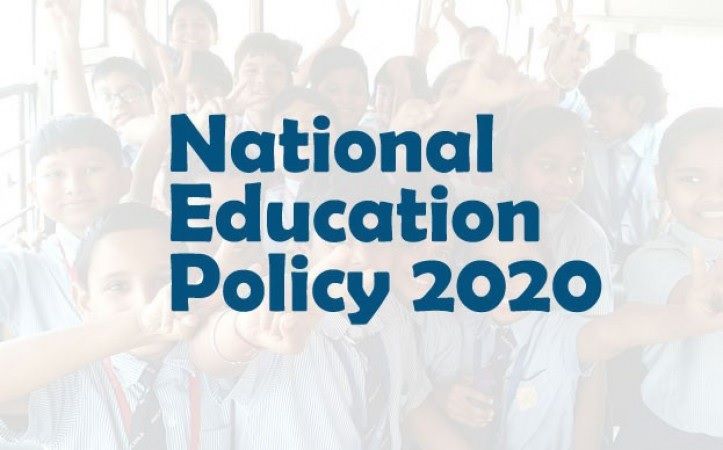NEP 2020: Great Jubilation all over Tamil Nadu (Part -2)
There are several reference leads via hyperlinks provided within. Readers are requested to use them to get the complete picture of the contents.

In this 2-part article, we shall have an overview of the New Education Policy, the controversies that have been created around it, an assessment of these controversies, as well as the missing aspects in the Policy.
There are several reference leads via hyperlinks provided within. Readers are requested to use them to get the complete picture of the contents.
1. There is ample freedom for students to choose their subjects, be they academic, art or sport. There is no line of distinction between curricular, co-curricular and extra-curricular subjects. This is very welcome as students can now focus on the areas of their interest. Time utilisation is tremendously increased as students are not forced to study and perform in subjects that may not be in tune with their natural aptitude and interest.
2. The policy aims to increase the Gross Enrolment Ratio to 50% (from the present 26%) by 2035. This is highly ambitious as it means doubling college going students. Since the policy has a strengthened foundation system that begins right from pre-school, and since there is going to be a transformational shift in the way the potential of the students are going to be tapped, the quality of students would increase making more of them eligible to go to college.
Yet again, there are long talks by some vested interests in Tamilnadu who question the validity of such an aim when the GER of Tamilnadu is already 49% and the 3rd highest in the country after Sikkim and Chandigarh. What is the validity of this statistical value when the truth remains very different?
The reason for such high enrolment as far as Tamilnadu is concerned is because of the ease with which students are able to get admissions to colleges. Wait, the reason is not student ability (which is under-nourished and under-developed thanks to the state education policy) – the reason is that the state government disproportionately prefers students from State Board schools which have heavy emphasis on rote learning over schools affiliated to other boards. This has lowered the quality of students getting in and out of colleges to such an extent that 40% of the Engineers graduating from the state are unemployable and are often under-employed as mere errand-boys that require no skill-training. The state TOPS in the number of unemployable Engineers in the country. So, what good is this 49% which is merely obtained by pushing rote learners into poor quality colleges (with corruption to the hilt) to earn their fees?
The education system was made worse - from what it earlier was - by a bunch of people with good intention but no real knowledge. Even the teachers employed in State Government schools are not spared as they are burdened with administrative jobs. This resulted in the present crisis where, rather than actually working on making the education system better, these politicians are roping in students to stage protests. The death of the young girl Anita over her inability to secure a seat to study medicine via NEET was no suicide but a forced death by these vested interests.
WHILE THE PREVIOUS POINT WAS ABOUT LANGUAGES, THIS IS ABOUT PURE SCIENCES. IT LOOKS LIKE THE STATE DOES NOT WANT ITS CHILDREN TO STUDY ANYTHING!
In the same breath, we see states all over the country encouraging children from all strata to prepare and qualify for professional courses. In Talented students from the rural areas are given high quality education at practically no cost through Navodaya Schools. Everywhere in the country, these schools have been getting outstanding results and these students go on to do well in higher education also. Tamilnadu is the only state where Navodaya Schools were not allowed to enter simply by politicising the issue.
In the speech, J. Venkatesan dwells on Tamizh traditions (such as water management) but, while what he states is not valid in Tamilnadu today where the High Court has questioned the state for encroaching water bodies. This is the state of Tamizh tradition (followed by these parties) as of now.
Of course, this is real Tamizh culture which these people must remind themselves of: கற்கக் கசடறக் கற்பவை கற்றபின் நிற்க அதற்குத் தக (Study until there is no residual doubt, once you study, live accordingly) – Thirukkural (391)
3. More freedom to opt for one’s own subjects as against the set ‘groups’. Most welcome policy of all from the student’s view-point. Good observation and performance-based guidance must be available for the students to make suitable choices.
4. Lesser weightage on public examination and the option of attempting twice to take the better score is also a welcome move. Credits obtained throughout the study period will be given weightage as much as the public exam. This not only reduces the stress of the students over the single point examination but would also encourage year-round learning of subjects.
5. Greater emphasis on research in higher education. This is a long overdue area of reform. Not only would this research culture help the country in attaining greater self-respect for its educational systems but also, with its huge youth potential, would turn the country into a global hub of inventions and innovations.
We have lost much via brain drain who have gone to many other countries and contributed through their research work. To be able to study well within the country and do the same would immensely benefit our country.
6. More flexibility in higher education by way of certification, diploma, and bachelor’s degrees. As per this, a person who completes 1 year would be issued a certificate, on completion of 2 years would be issued a diploma and one who completes 3 years would be issued a bachelor’s degree and the 4th year would be dedicated to research, completion of which would be the most recommended. Credits obtained earlier would be valid in the future, thus enabling students to continue at a later time. Such systems are prevalent in other parts of the world and they help the students to make the investment of time into studies more flexible. The advantage of carrying forward the credits would be a prompt to get the students to pursue their studies at a later date.
7. Making a 4-year integrated degree in Education a compulsory requirement for teachers. A much-needed move where the teacher is trained in pedagogy along with a subject degree.
8. Giving more autonomy to Universities. This would enable better functioning with shorter decision-making chains, better people management, more competitive and collaborative edge with fellow-institutions. It would reduce bureaucracy and corruption in selection of employees. Of course, it is expected that there would be overrides with Government take-over in case of mismanagement.
9. Allowing top universities to set up campuses within Bharata. This is welcome as long as we ascertain that the foreign universities provide quality equivalent of their parent institute and also do not go against Bharatiya culture.
10. Universities to have science, humanities and technology within the campus. This is also a well-intended move. The precaution that the Government has to take is to disallow student politics to enter campuses because of this.
The few points that I would want the education system to take cognizance of are:
Spiritual:
(i) Teacher training MUST include training in dharma.
(ii) At all levels, students must be guided by teachers to inculcate dhaarmic principles and virtues into their lives. Social cohesion, cooperation and harmony must be taught through interactive exercises that teach these. Viewing oneself as an integral part of nature must also be taught.
Personality:
(iii) Discipline (of time, of cleanliness, of etiquette, of social behaviour and so on) must be strongly developed in students. As somebody who has lived outside Bharata, I have seen how our own people are capable of being and behaving elsewhere which they often fail to do within our own country. People from other nations and cultures, despite not inheriting as great a culture and tradition as ours, gain a lot more respect due to these forms of disciplined behaviour.
Health:
(iv) Hatha yoga and pranayama must be made compulsory for all students as well as for teachers.
Intellectual:
(v) Peer learning and collaborative learning must be promoted. In the Lower Primary (Grades 1-2) and Preparatory levels (Grades 3-5), the suggested system would be to have a Home Teacher with a mix of children from the respective grades. This will enable students to mingle with ‘seniors’ and ‘juniors’ enabling easier, more dynamic transmission of knowledge while keeping the students comfortable with learning.
In summary, this education policy DOES NOT discriminate based on region, language or culture. On the other hand, it only promotes all of these to a greater level. Tamil has the greatest opportunity to make inroads into other states now. Tamilnadu must create a framework to prepare more Tamil scholars and teachers to go to other parts of the country to teach our ancient language. Personally, I am aware that there is a huge demand for Tamil across the country.
கேடுஇல் விழுச்செல்வம் கல்வி ஒருவற்கு மாடுஅல்ல மற்றை யவை. (Knowledge alone is true wealth, all else don’t amount to much.) - Thirukkural (400)
May the divine Mother Saraswati’s grace flow through our beloved motherland forever! Jai Hind!

